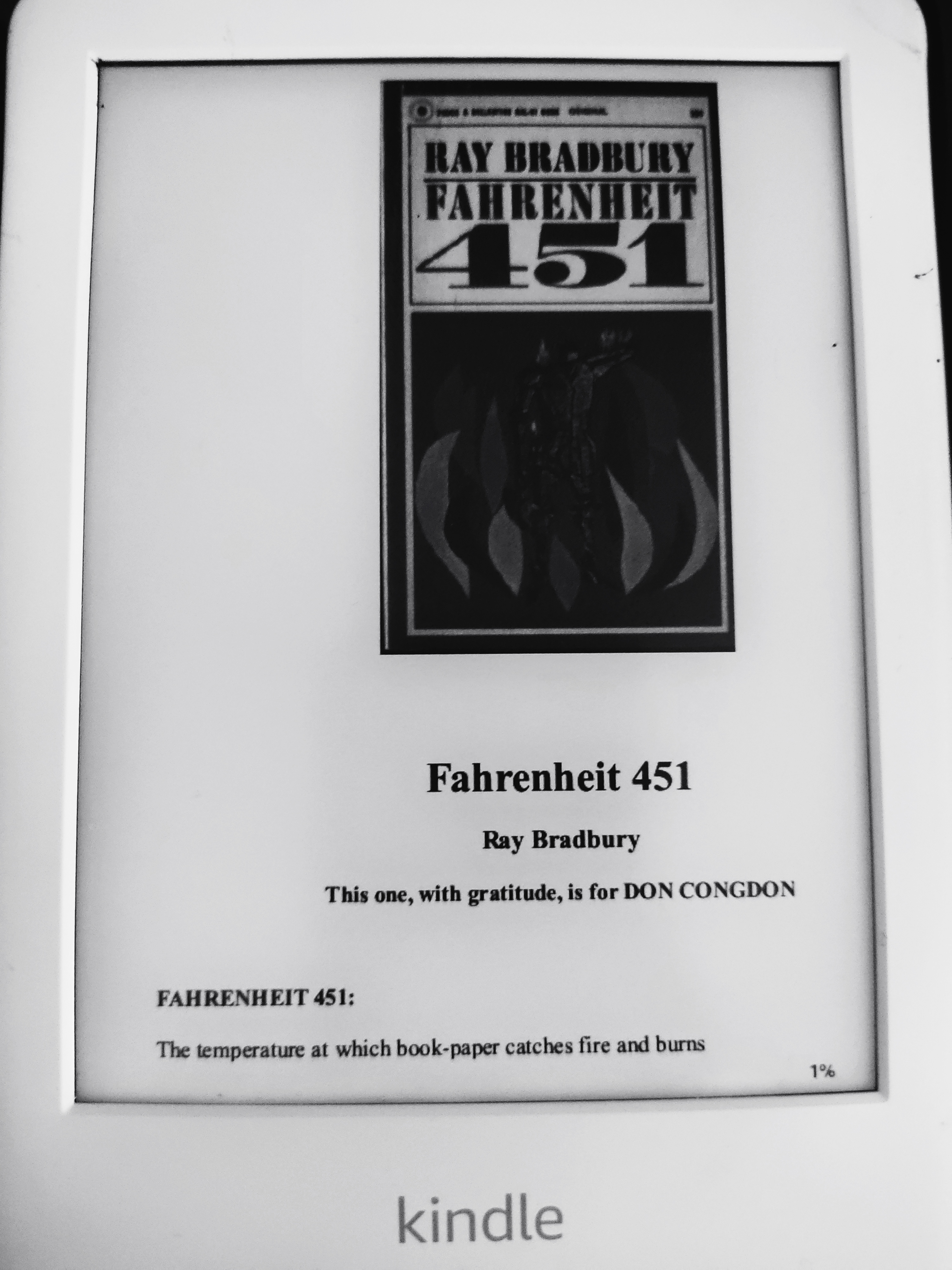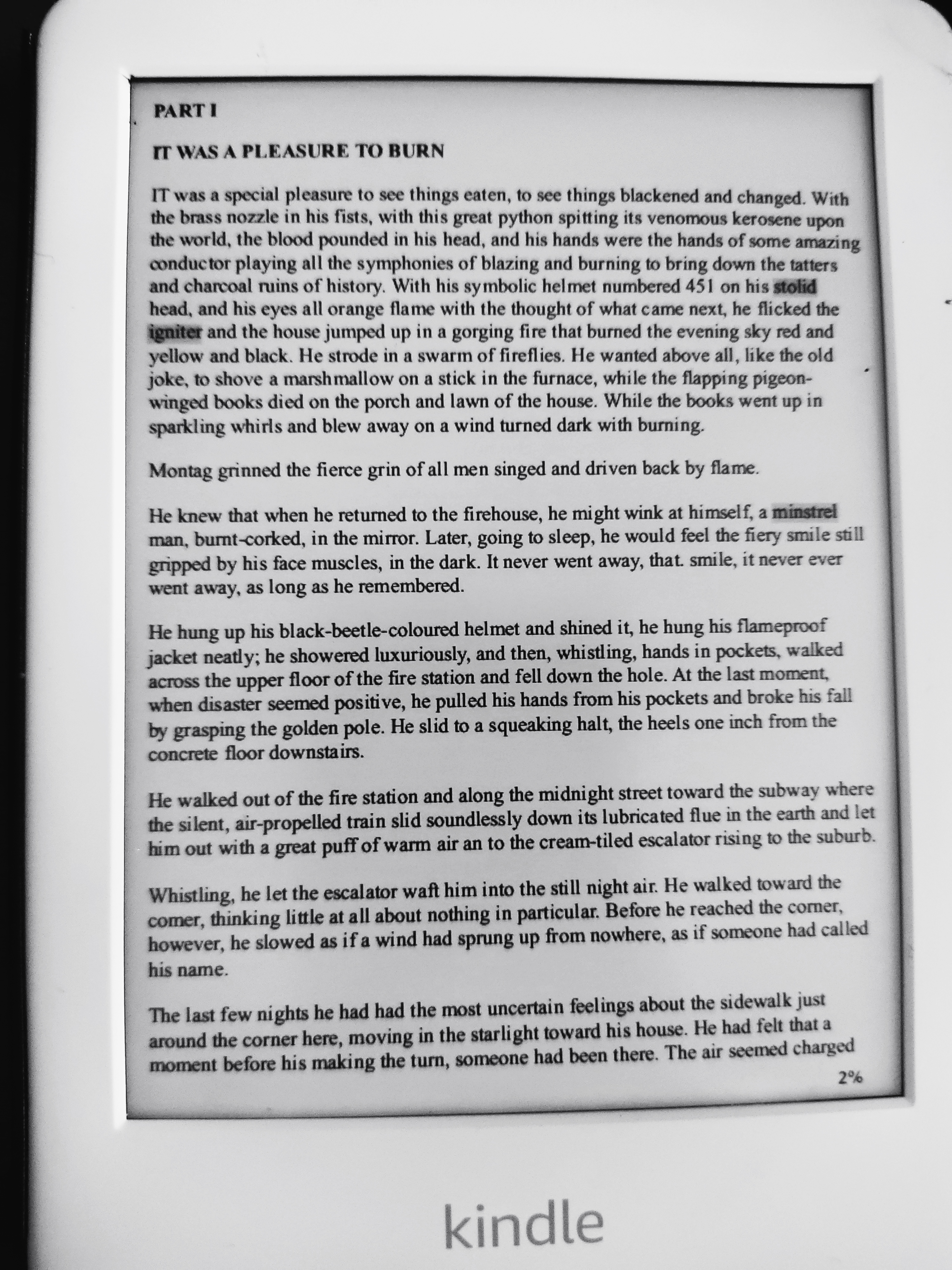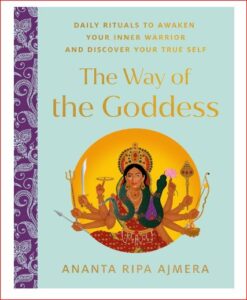Book: Fahrenheit 451
Author: Ray Bradbury
Publication: Harper Voyager; New Ed edition (4 August 2008)
Pages: 192
Price: Click the link
Review Rate: 5
Introduction:
Fahrenheit 451 by Ray Bradbury is a great classic novel for all readers.
“I want you to meet Jonathan Swift, the author of that evil political book, Gulliver’s Travels! And this other fellow is Charles Darwin, and this one is Schopenhauer, and this one is Einstein, and this one here at my elbow is Mr Albert Schweitzer, a very kind philosopher indeed. Here we all are, Montag. Aristophanes and Mahatma Gandhi and Gautama Buddha and Confucius and Thomas Love Peacock and Thomas Jefferson and Mr Lincoln, if you please. We are also Matthew, Mark, Luke, and John. … We’re book-burners, too. We read the books and burnt them, afraid they’d be found…Always the chance of discovery. Better to keep it in the old heads, where no one can see it or suspect it. We are all bits and pieces of history and literature and international law, Byron, Tom Paine.”
They are all escaping, running, at the fear of authority that outlawed books to avoid free thinking. Montag is one such who escapes his country with the memory of the books he reads.

In a Nutshell:
Montag is a fireman who does not douse the fire but who burns books.
No nook, no idea, no free-thinking.
Montag is in the same shoe, the same profession, that his father and grandfather follows without questioning or with a mute one. Any way Montag is not happy, though it is hard to confess till Clarisse Mc Cellar, a seventeen-year-old girl with crazy thoughts in her head asks him the question that he avoids always.
“Then she seemed to remember something and came back to look at him with wonder and curiosity. “Are you happy?” she said. “Am I what?” he cried. But she was gone-running in the moonlight. Her front door shut gently. “Happy! Of all the nonsense.” He stopped laughing.”
Anyway, he has to confront the truth,
“He was not happy. He was not happy. He said the words to himself. He recognized this as the true state of affairs. He wore his happiness like a mask and the girl had run off across the lawn with the mask and there was no way of going to knock on her door and ask for it back.”
Mildred, his wife is a hollow lady who dares to attempt suicide by taking sleeping pills but does not want to face her situation. She likes to live in fake happiness.
She feels hungry after her poisoned blood is replaced. It hints at the empty lifeless existence. It is better to be hungry than to recall why she wants to die. She prefers television and dumb merriment over books. She forgets the death of Clarisse so casually. When Montag reads books, she gargles meaningless words and tries to practice happiness.
Montag’s perturbation escalates with a series of incidents that force him to question his life. His wife’s suicide attempt, the death of an old woman by burning herself in the pyre of her hidden books, Clarisse’s death stir him to utmost discomfort.
“There must be something in books, things we can’t imagine, to make a woman stay in a burning house; there must be something there. You don’t stay for nothing.”
He wants an answer to his desperation.
“No, not water; fire. You ever seen a burned house? It smoulders for days. Well, this fire lasts me the rest of my life. God! I’ve been trying to put it out, in my mind, all night. I’m crazy with trying.”

The Book Thief:
He tries to find the solution in the books that he himself steals in his expedition of burning. Here he resembles Liesel, the book thief in The Book Thief by Markus Zusak. She steals a half-burnt book from the dousing fire during Nazi’s book-burning festival celebrating Hitler’s birthday.
Montag feels the importance of books in spite of the threats and challenges that he has to face.
“It’s not just the woman that died,” said Montag. “Last night I thought about all the kerosene I’ve used in the past ten years. And I thought about books. And for the first time, I realized that a man was behind each one of the books. A man had to think them up. A man had to take a long time to put them down on paper. And I’d never even thought that thought before.”
He realized that a man takes his life to shape his thoughts in a book that a fireman burns in a twinkle of time.
“It took some man a lifetime maybe to put some of his thoughts down, looking around at the world and life, and then I came along in two minutes and boom! It’s all over.”
This gravity of thought lays in the transformation of Guy Montage a book burner to a book lover.
The Renegade:
But Montag gets caught in the hand of Fire Chief Beatty who burnt his house along with the books. With the help of Faber, an aged English Professor and his old friend, he escapes the clutches of mechanical hounds and reaches the country where he meets some fugitive intellectuals, who memories books in their heads.
The Hollow Men:
Setting in a dystopian backdrop, Fahrenheit 451 by American Novelist Ray Bradbury, underpins a social catastrophe, a picture of an oppressive society that forces people to live in uncomplicated happiness without questioning their position in society. Here books are considered as outlawed, nonsense stuff. So keeping books and reading them is a criminal offence.
Here people talk gibberish and watch television, the witless media of entertainment.
“Montag heard the voices talking, talking, talking, giving, talking, weaving, reweaving their hypnotic web.”
It reminds me of Eliot’s The Wasteland
We are the hollow men
We are the stuffed men
Leaning together
Headpiece filled with straw. Alas!
(The Hollow Man, T.S Eliot)
Nomenclature:
Fahrenheit 451 is the autoignition temperature of the books, i.e. the temperature in which papers burn.
The book is divided into three parts-
-
The first part “The Hearth and the Salamander” is associated with the fire. It is believed that salamander can live in the fire without getting burnt. And the hearth is the fireplace in a room.
-
The second part “The Sieve and the Sand” refers to Montag’s childhood memory when at the persuasion of a cruel cousin he tried to fill a sieve with sand. Sieve is the symbol of the mind that always tries to hold the sand, the knowledge. Here it refers to Montag’s futile attempt to grasp the knowledge.
-
“Burning Bright”, the third part is an allusion to the myth of the phoenix that burns to be reborn. Phoenix bears the hope of rebirth, fecundity, and spiritual resurrection. Fire is the most powerful and recurrent symbol of the novel. Here fire destroys and also creates.
The Ray of Hope:
The novel ends with a hope…a streak of light amidst the cloud of nuclear smoke.
“Somewhere the saving and putting away had to begin again and someone had to do the saving and keeping, one way or another, in books, in records, in people’s heads, anyway at all…”
The book lovers are waiting for a quick war that will destroy everything and out of the ashes, a phoenix will be reborn at the dawn of a nascent sky.
When the war’s over, perhaps we can be of some use in the world.” “Do you really think they’ll listen then?”
Just like the ending of The Wasteland, “Shantih, shantih, shantih” here we rise from a total bleak atmosphere with the vows to rebuild a new civilization out of rubbles and debris.
“We’ll pass the books on to our children, by word of mouth, and let our children wait, in turn, on the other people.”
Alvina’s Verdict:
I think Fahrenheit 451 is not fiction but a naked truth applicable for all times. Even in today’s world we are chasing selfish pleasure, disconnected from each other with an empty heart. How many of us become aware of the ingenuity of our souls that is getting destroyed and deranged by incineration of our conscience and contemplation? We are bingeing over our flirting carcasses. Setting in an unspecified city this novel crosses the boundary of place and time. The vacuousness of a Television obsessed civilization can easily be replaced and reconsidered with today’s smart phone-obsessed self-centric, a selfish generation where free-thinking and questioning are charged as sedition. We are lured to imbue in a shallow comfort zone of arid fun making, mortgaging our brain at the virtual world of make-believe network.
Clarisse was there to shake Montag out of his stupor.
“Are you happy?”
But for us ‘Waiting for Godot’ is everyday drama.







Pingback: Book Reading Benefits- Developing Good Habit, Knowledge,
Pingback: Alice Thompson's Gothic Novel The Book Collector - Blog Alvina